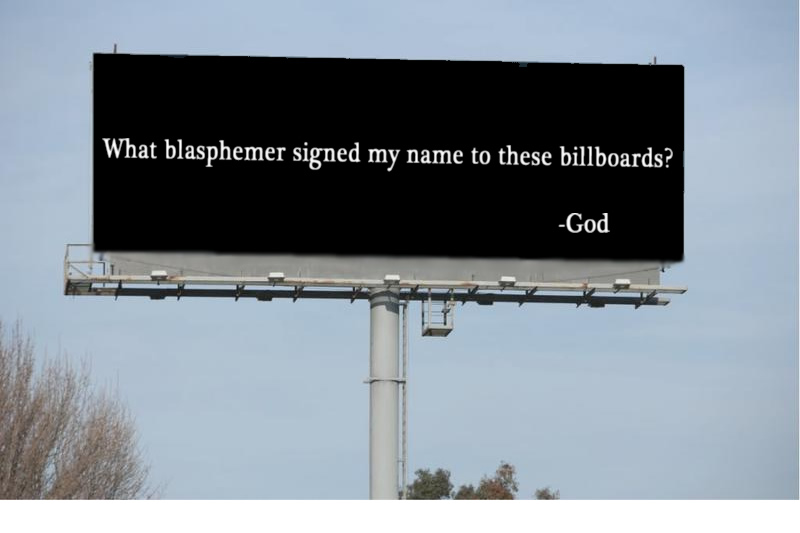Today I drove past another of those black billboards with white typewriter letters forming cute little remarks like, “If you think it’s hot now, wait’ll you get to hell.†Or “Let’s meet at my place Sunday before the game,†signed “God.†The one I saw today said, “There’s no downside to a relationship with me.†Again, God. Not only do such billboards constitute yet more trivialization of the Christian religion by Christians; they also raise more serious questions, not to mention greater ironies.
Anyone familiar with the work of Christian apologists like William Lane Craig, Richard Bauckham, and Mike Licona knows how vociferously they resist the notion that early Christians would have coined sayings, then fathered them on Jesus to give them greater authority (anybody gets trumped by the Son of God). And the apologists have the same motivation: they want to convince you that you have to believe the statements ascribed to Jesus in the Bible. The early Christians knew nobody would believe and obey something they told you on their own authority, namely no authority. So they used the Jesus character as a ventriloquist dummy. And today’s apologists are doing the same thing. “Jesus†is the megaphone for the opinions of mere mortals. There’d be no reason to believe them, so they hide behind the curtain in the special effects booth, thundering their dictates as if they came from God, AKA the Great and Powerful Oz.
I find it hilariously ironic and very revealing that their own people are doing just what evangelical apologists maintain the New Testament Christians never did. These billboards are created by evangelicals who have no qualms about making up cute sayings of their own and slapping “God†under them.
“Oh, but they don’t really mean that somebody, in some prophetic trance, heard the Hestonian voice of God! They figure anyone who reads the signboards will realize it’s kind of a ‘what-if’ gag.†Really? Maybe so. But then how do we know the early Christians attributing sayings to Jesus meant it literally either?
The practice of evangelical Christians refutes the arguments of their own apologists. But it’s a lot bigger than that. Is there any reason to believe that any of the things human beings have ever said God said had a different origin from today’s billboard oracles? It’s not just a matter of religious fanatics fighting over which set of scriptural doctrines is the true one. Even to frame it that way is to mystify what’s going on. Really it boils down to two (or more) groups of loudmouths engaged in a shouting match. For them to declare “God says so!†is just to shout that much louder. “I said it! God believes it! That settles it!â€
It’s propaganda pure and simple. And the appeal to “authoritative†revelation is designed to circumvent reason and logic. If “God†said it, well then, it must be right! “Even if it makes no sense to me, it must nonetheless be true. God is certainly smarter than me!†If there were one, yes, sure, he’d have to be. But what reason is there to think there is a deity who issues these commandments and doctrines? What possible reason is there to believe “his†“revelations†have not been cooked up by fellow mortals (and not necessarily very smart ones)?
As Durkheim suggested, any society christens as “divine sanctions†those man-made rules and values it deems most important. The rule-making elders understand that, if people knew these rules were the invention of mere mortals like themselves, they would say to themselves, “Well, that’s just the opinion of those mossbacks! Who says they’re right and I’m wrong?†And then, they fear, you’d be asking for chaos, as the Book of Judges puts it, “every man doing what is right in his own eyes.†So, the rule-makers think, it will be safer to intimidate the mob into believing the gods have handed down these rules and will kill us or damn us if we disobey. In this event, even if the rules and values are fine and good, the system becomes corrupted by the simple fact of deceit at the foundation of it. It is the sin of priestcraft, of pious fraud. Humans appoint themselves the Grand Inquisitor. They, like the Mullahs of Iran, are sure they know better than the rest of us and do not trust us with freedom of action and free thought.
The Book of Revelation, chapter 13, depicts a scene in which the False Prophet, the promoter and press secretary of the Beast, the end-time tyrant, wows the crowd by making a statue of his master seem to speak aloud. As I read it, the point is not that the False Prophet performs a genuine miracle, albeit Satanically inspired, but rather that he is conning the rubes by using a common stage illusion. Even in the ancient world tricksters and entertainers used ventriloquism and voice-throwing to make it look like a statue spoke. What the False Prophet did was cheap priestcraft.
And that’s what religion has always done when its spokesmen have elevated their own best (?) thoughts to the status of divine revelation. And no one stoops to this if they are convinced of the persuasive logic of their position.
I think that’s as plain as if it were plastered on a billboard.
So says Zarathustra.



2 Responses to Giving Voice to the Image of the Beast